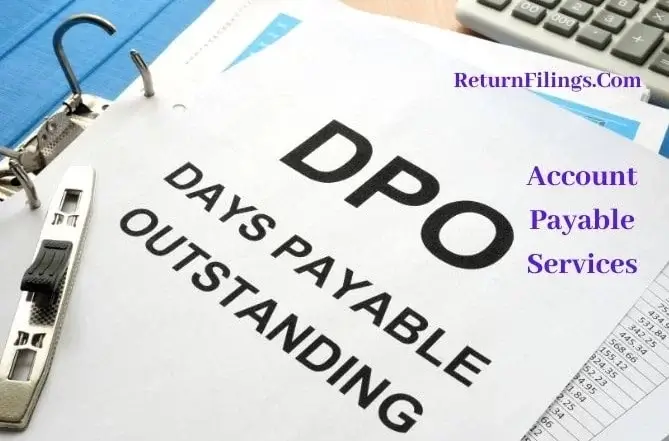Accounts Payable Services India: Process, Outsourcing & Key Benefits
Accounts Payable (AP) is a critical component of a company’s financial management process. It involves managing and processing the company’s liabilities, including vendor payments, invoices, and other expenses. Efficient management of accounts payable ensures smooth cash flow, strengthens vendor relationships, and helps in maintaining financial integrity.
This comprehensive article will walk you through the key aspects of Accounts Payable services, including its importance, the process, best practices, benefits, and how outsourcing these services can help businesses streamline their operations.
1. Introduction to Accounts Payable (AP) Services
Accounts Payable services involve the management of a company’s financial obligations to its suppliers or creditors. The main tasks include receiving invoices, verifying their accuracy, processing payments, and maintaining a record of all transactions.
AP is an essential function for businesses of all sizes, ensuring they maintain a healthy cash flow and good relationships with vendors. When managed properly, accounts payable can contribute to efficient financial management and strategic growth.
2. Importance of Accounts Payable Services
2.1 Managing Cash Flow
One of the primary functions of accounts payable is to manage cash flow effectively. By ensuring that payments are made on time and not prematurely, companies can optimize their available cash for daily operations and future investments.
2.2. Maintaining Vendor Relationships
Timely and accurate payments help build strong relationships with suppliers and vendors. This can lead to favorable terms, discounts, and priority services, enhancing the company’s operational efficiency.
2.3. Financial Control and Accuracy
A well-managed AP system provides greater control over a company’s finances. It helps track all outgoing payments, preventing errors, overpayments, or missing payments, ensuring compliance with company policies and tax regulations.
2.4. Regulatory Compliance
Effective AP management ensures compliance with tax laws, including VAT, GST, and other applicable taxes, preventing legal issues or penalties. Accurate record-keeping also simplifies the auditing process.
3. The Accounts Payable Process
The accounts payable process typically involves the following steps:
3.1. Invoice Receipt
When goods or services are delivered, vendors send invoices to the business. These invoices include details such as the amount owed, the due date, payment terms, and any applicable discounts.
3.2. Invoice Verification
Once received, invoices must be reviewed for accuracy. This includes verifying that the details on the invoice match the purchase order (PO) and the goods or services delivered.
3.3. Approval Workflow
After verification, the invoice needs approval from authorized personnel before processing. This approval process ensures that the expenditure is legitimate and within budget.
3.4. Payment Processing
Once approved, the accounts payable team processes the payment based on the agreed terms (e.g., net 30, 60 days). Payments can be made through checks, wire transfers, or electronic funds transfers (EFTs).
3.5. Record-Keeping and Reporting
After payment is made, the transaction is recorded in the company’s books. Maintaining an organized record of accounts payable transactions is essential for reconciliation, financial reporting, and audit purposes.
4. Types of Accounts Payable Services
Various tasks can be outsourced or managed through accounts payable services. Some of the most common AP services include:
4.1. Invoice Processing
This involves receiving, reviewing, and verifying vendor invoices for accuracy. The service also includes matching invoices with purchase orders (PO) and receipts to ensure correctness.
• Example: A manufacturing company may receive thousands of invoices monthly. Outsourcing invoice processing helps streamline this activity and reduces the risk of errors or duplicate payments.
4.2. Payment Processing
Payment processing includes preparing and executing payments based on approved invoices. This service can involve managing multiple payment methods, such as bank transfers, checks, or credit card payments.
• Example: A retail company outsourcing payment processing might opt for a system that automatically schedules payments based on due dates, reducing manual oversight and human error.
4.3. Vendor Management
Vendor management includes maintaining accurate records of vendors, handling queries and disputes, and negotiating payment terms. AP services often include managing relationships and ensuring that vendors are paid on time.
• Example: An e-commerce business can streamline its vendor management through an AP outsourcing provider, ensuring that suppliers are paid timely and maintaining optimal supplier relations.
4.4. AP Reconciliation
Reconciliation is the process of ensuring that the company’s accounts payable balances match the vendor records and the general ledger. Regular reconciliation helps detect errors, prevent fraud, and maintain financial accuracy.
• Example: A consulting firm outsourcing AP reconciliation can ensure that monthly payments are consistently recorded correctly and aligned with the financial statements.
5. Benefits of Accounts Payable Services
5.1. Improved Cash Flow Management
By outsourcing AP services, businesses can maintain better control over their cash flow, ensuring timely payments and preventing cash shortages.
5.2. Enhanced Accuracy and Reduced Errors
Outsourcing to AP specialists ensures that invoices are processed correctly, reducing human error. This leads to fewer discrepancies, less time spent on dispute resolution, and more accurate financial reporting.
5.3. Cost Efficiency
Outsourcing accounts payable can help businesses reduce overhead costs associated with hiring full-time staff and investing in AP software. Companies can access experts at a fraction of the cost.
5.4. Time Savings
Outsourcing frees up internal resources that would otherwise be spent managing AP tasks. This allows employees to focus on more strategic activities that add value to the company.
5.5. Better Vendor Relationships
Timely payments to vendors enhance business relationships. Companies that manage accounts payable effectively are likely to secure better payment terms and build stronger partnerships.
5.6. Compliance and Audit Readiness
Outsourcing ensures that AP processes comply with relevant regulations and taxes. Additionally, a well-organized system makes it easier to prepare for audits and avoid penalties.
6. Outsourcing Accounts Payable Services: Key Considerations
Before outsourcing accounts payable services, businesses should consider the following factors:
6.1. Provider Expertise
Ensure that the outsourcing provider has extensive experience in managing accounts payable and a strong understanding of the industry-specific requirements.
6.2. Data Security and Confidentiality
The outsourcing provider must have robust security protocols to protect sensitive financial data. It is essential to ensure that all data is stored and transmitted securely.
6.3. Scalability and Flexibility
The chosen service provider should be able to scale according to the company’s needs. The AP outsourcing solution should be adaptable to growing transaction volumes.
6.4. Integration Capabilities
The AP outsourcing provider should offer services that integrate seamlessly with your existing accounting and ERP systems for efficient financial reporting and record-keeping.
6.5. Transparency and Reporting
Choose a provider that offers transparent processes and regular reporting. Businesses should receive detailed reports on the status of their accounts payable, including upcoming due payments and outstanding balances.
7. Conclusion
Accounts payable services are a fundamental part of a company’s financial operations. Whether managed in-house or outsourced, having an efficient accounts payable system is crucial to maintaining cash flow, reducing costs, and improving vendor relationships. Outsourcing accounts payable can save time and money, enhance accuracy, and provide scalability for businesses of all sizes.
By leveraging outsourcing, companies can access specialized expertise and technology, enabling them to focus on core business functions while ensuring financial processes are managed effectively.
For professional assistance, reach out to us on email: info@returnfilings.com or on whatsapp: https://wa.me/919910123091.
frequently asked questions (faq's) related to Accounts Payable Services
Q What are accounts payable (AP)?+
A Accounts payable are the short‑term liabilities a business owes its suppliers for goods or services received on credit.
Q Why is accounts payable important?+
A
- Maintains good vendor relationships through timely payments.
- Supports effective cash‑flow management.
- Ensures accurate expense tracking and reporting.
- Enables early‑payment‑discount savings.
Q What is the accounts payable process?+
A
- Receive & verify invoices.
- Match invoices to POs / GRNs.
- Approve invoices for payment.
- Process payments (cheque / EFT).
- Record payments in the system.
- Reconcile vendor statements.
Q What are accounts payable services?+
A Third‑party providers manage some or all stages of a company’s AP cycle.
Q What services are typically offered by accounts payable providers?+
A
- Invoice capture and data entry
- Three‑way matching and approvals
- Payment processing (cheque / electronic)
- Vendor master management
- Expense and AP reporting
- Audit and compliance support
Q What are the benefits of using accounts payable services?+
A
- Cost savings over in‑house processing
- Faster, more accurate workflows
- Regulatory compliance support
- Stronger vendor relationships
- Internal staff freed for core tasks
Q What are the different types of accounts payable services?+
A Options range from basic invoice‑data capture to fully outsourced AP, including end‑to‑end automation.
Q How do I choose an accounts payable service provider?+
A
- Match services to your needs.
- Check automation and ERP integration.
- Review security and confidentiality controls.
- Assess experience and references.
- Compare transparent pricing.
- Evaluate support and responsiveness.
Q Who can provide accounts payable services?+
A Accounting firms, BPO companies, and niche AP‑service providers.
Q How much do accounts payable services cost?+
A Costs depend on invoice volume, process complexity, and service scope. Email info@returnfilings.com or WhatsApp +91 99101 23091 for a quote.
Q What are the responsibilities of the client?+
A
- Provide accurate vendor data.
- Approve invoices when required.
- Inform provider of vendor changes.
Q What are the responsibilities of the accounts payable provider?+
A
- Process invoices accurately and on time.
- Maintain data confidentiality.
- Deliver regular AP reports.
Q What is AP automation software?+
A Software that automates key AP tasks such as invoice capture, approval workflows, and payment processing.
Q What are the benefits of AP automation?+
A
- Faster processing and lower costs
- Fewer errors and duplicates
- Greater control and real‑time visibility
Q How do I process invoices?+
A Match invoices to purchase orders and GRNs, approve, then schedule payment.
Q What is a purchase order?+
A A document authorising a vendor to supply specified goods or services.
Q What is a receiving report?+
A Also called a Goods Receipt Note (GRN), it confirms goods or services were received.
Q How do I reconcile vendor statements?+
A Compare the vendor’s statement with your AP ledger, investigate and resolve discrepancies.
Q What are early payment discounts?+
A Price reductions vendors offer for settling invoices before the due date.
Q How can I improve my accounts payable process?+
A Implement AP automation, set clear approval paths, and review KPIs regularly.
Q What are the common accounts payable challenges?+
A Manual data‑entry errors, lost invoices, and late payments are frequent pain points.
Q How can I reduce AP costs?+
A Automate workflows, negotiate better terms, and capture early‑payment discounts.
Q What is the difference between accounts payable and accounts receivable?+
A AP records what a company owes suppliers; AR records what customers owe the company.
Q Where can I find resources for accounts payable management?+
A Numerous online guides, books, and courses cover AP best practices and automation trends.
- For further reading, explore the following topics:
- 📑 Business Benefits of Financial Reporting Services in India: Types & Compliance Regulations
- 🔑 Strategic Business Planning Services India: Process, Framework & Value for Companies
- ⚖️ LPO Services in India: Types of Legal Process Outsourcing, Benefits & Selection Guide
- 💸 Affordable Accounts receivable and accounts payable services in India

